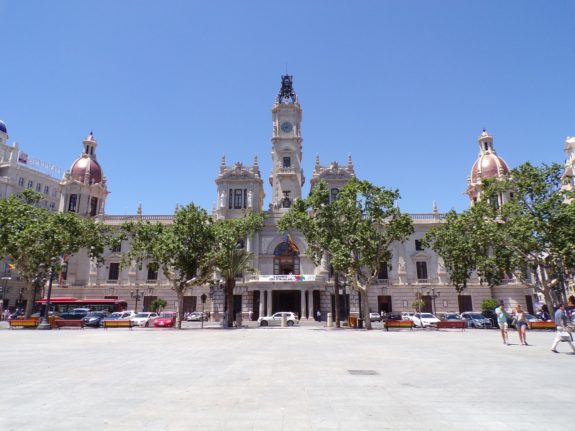Public holidays
There are three public holidays in December. Wednesday, December 6th is the day of the Spanish Constitution and December 8th is the Day of the Immaculate Conception. This of course gives rise to the December Puente or bridge, also known as the Puente de la Constitución, with many Spaniards taking off Thursday the 7th as well and enjoying a five-day break with the weekend added on.
The third public holiday is of course Christmas Day on December 25th.
READ MORE: Why are December 6th and 8th public holidays in Spain?
Events in December
Spain will be gearing up for Christmas with lots of decorations, light-switching on ceremonies, Christmas markets and Belénes or nativity scenes set up in cities across the country.
Then after Christmas on December 28th, Spain celebrates the Día de los Santos Inocentes (Day of the Holy Innocents), its version of April Fools when people play pranks and jokes throughout the day.
New Year’s Eve or Noche Vieja is also a big deal in Spain, with plenty of parties, family dinners and the tradition of eating 12 grapes at midnight to bring good luck for the year ahead.
December weather
After an abnormally hot year with heatwaves starting as early as April in some places and lasting well into September, Spain is finally cooling down and the cold weather is arriving. While it’s still a little early to tell exactly what the weather will be like in December, meteorologists are predicting a pretty typical start to the month with cold temperatures.
December is also the wettest month of the year in large areas of Spain. In Extremadura and Andalusia, as well as areas of Castilla y León and Galicia, this month provides between 15-20 percent of the annual rainfall, reaching almost 30 percent in areas of Andalusia. Let’s hope that next month sticks to the norm and provides much-needed rain to parts of the country experiencing a long-term drought.
Drought restrictions in Catalonia
The worst drought in a century in Spain’s Catalonia region is getting worse. Water usage restrictions are now in place and officials have warned it may be necessary to bring fresh water to Barcelona by boat in December.
Local officials have urged Catalonia’s roughly eight million residents to limit their water consumption, and late last year the region imposed reductions in water use for the irrigation of crops and industry.
Town halls have stopped filling public fountains, and using water to fill private swimming pools has been banned.
The regional government of Catalonia announced Tuesday that new restrictions will come into force in the most populated areas of the region, including a reduction in the distribution of water per inhabitant to 210 litres per day from 230 litres.
That would affect consumers with a higher than average water consumption.
Amnesty debate in Parliament
The Socialist-led government has proposed that the first debate in Parliament on the controversial amnesty be discussed on December 12th, so we can expect more right-wing protests to make headlines in December as Sánchez attempts to have the legislation passed which will pardon Catalan separatists.
December will also be the first whole month of the PSOE-Sumar coalition in power after a six month deadlock following July’s inconclusive general election, meaning that there will soon be news regarding possible new laws and changes implemented across the country.
Rent cap ends
Currently, the limit for rental increases in Spain is set at two percent, but this was only a temporary measure with the objective of mitigating the effects of inflation, which reached 8.4 percent in 2022. This means that the rent cap is due to end on December 31st, 2023.
In April 2023 an agreement on the new Housing Law stated that there would be a three percent cap on annual renewals of rental contracts in 2024. In 2025 and onwards a new index will also be created that aims to be more stable and lower than the evolution of the CPI.
Spanish wine labels to change
From December 8th bottles of wine sold across Spain and the EU must start displaying the contents’ nutritional value. In practical terms, this means that labels on bottles of wine will, from that date, have to list any added sugars, preservatives and other stabilisers used in the manufacture of the wine.
European institutions have agreed that only the energy value – in kilocalories or kilojoules (the metric measurement of calories) instead of a Nutri-Score will be displayed.
Possible baggage handler strikes for the December Puente
Spain’s General Union of Workers (UGT) has proposed walkouts at all Spanish airports for ground handlers, those who manage luggage, loading and unloading of planes and cleaning. They are striking due to the “constant non-compliance in labour matters by all companies” over the last seven years, explain the workers’ representatives.
It remains to be seen exactly which days the strikes will be carried out and if the rest of the unions will join the call to action or not.
Ski resorts opening
Some Spanish ski resorts will be opening next month, allowing for the first winter sports of the season. This means that you won’t have to wait long until you can hit the slopes of some of Spain’s best ski resorts. Baqueira-Beret and La Molina (Catalonia) will open a bit earlier November 25th until April 9th and 1st respectively.
Formigal-Panticosa (Aragón) will open on December 1st with the season running until March 31st, while the Sierra Nevada (Granada, Andalusia) will open on December 2nd and run until April 21st. Valdezcaray (La Rioja) will also open on December 2nd with the season lasting until April 7th.
READ ALSO: Eight amazing ski resorts in Spain
Regulated gas prices for buildings with a community of neighbours are ending
The regulated natural gas rate (TUR) that neighbouring communities have been able to contract for almost a year ends on December 31st, meaning that gas prices are set to skyrocket by up to 50 percent in 2024 for some.
This measure was originally on a temporary basis to try to alleviate the escalation in energy prices, but there were hopes that there would be an extension.
Vigo’s much-anticipated lift is due to open
The Galician city of Vigo is to inaugurate its new elevator in December. The Halo of Vigo is a new attraction, allowing people to ride up and down a giant see-through circle, affording spectacular panoramic views across the city. The lift measures 40 metres high and 90 metres across and costs a total of €15 million.
After several issues and walkouts, however, the opening has been delayed. The local government has approved a budget modification of €2 million to finish the works and avoid more strikes. It is thought that it will finally be completed by December.
New train and flight links for Murcia
On December 10th 2023, Avlo will begin operating its new train between Madrid and Murcia.
It will take approximately three hours and a half to complete the journey.
The Avlo train departs from Madrid’s Chamartín and stops at six towns and cities before reaching Murcia. The stops are Cuenca, Albacete, Villena, Alicante, Elche and Orihuela.
READ MORE: Spain’s new low-cost Avlo train between Madrid and Murcia
This is also coinciding with the launch of new flight between Madrid and Murcia on December 1st, through low-cost Spanish airline Volotea, with ticket prices starting at €19.
On Sunday December 3rd, Volotea will also start flying from Murcia to Barcelona.



 Please whitelist us to continue reading.
Please whitelist us to continue reading.
Member comments